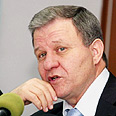
Sheetrit. Welcomes decision
Photo: Ofer Amram
Governmental committee to discuss new Arab city
Fourteen ministers vote in favor of inter-ministerial committee to advance establishment of new city in Galilee; four ministers vote against move. Interior minister says seeks to build 'a modern town, where every young couple will be able to buy a house'
The government decided Sunday to task an inter-ministerial committee with advancing the establishment of a new Arab city in the Galilee.
The committee is scheduled to submit its recommendations till the end of 2008, Interior Minister Meir Sheetrit announced.
Fourteen ministers supported the decision and four voted against it.
The committee will be chaired by Interior Ministry Director-General Aryeh Bar, and its members will be other ministries' director-generals, including the Defense Ministry director, and Treasury officials.
Sheetrit, who initiated the move, welcomed the decision and said that it was a significant step.
"There is a need to expand the variety of possibilities available to the non-Jewish population," he explained. "My aspiration is building a new Arab city in the Galilee. I have been advancing its establishment and planning for several months now. The plan is to build a modern city where every young couple will be able to buy a house like in every other city in the world."
Arab engineers in professional team
The ministers were told that "the preparation of dozens of project outlines for the non-Jewish communities have raised the need to expand the variety of possibilities available for the non-Jewish population."The demographic and social changes in this population and the need to integrate this population into the economy and society in Israel entail the establishment of a new urban area for this population. This need is particularly obvious on the backdrop of the non-Jewish communities' traditional structure."
According to the explanation presented to the ministers, the non-Jewish urban communities have mostly developed from rural communities. "In light of this situation, there is a difficulty to create a regulated urban infrastructure in the fields of employment, education, culture and welfare, and particularly in terms of transportation and sanitation."
The government plans to include Arab engineers in the professional team's work.















